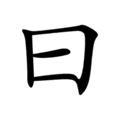Top Qs
Timeline
Chat
Perspective
曰
From Wiktionary, the free dictionary
Remove ads
| ||||||||
| ||||||||
Translingual
Han character
曰 (Kangxi radical 73, 曰+0, 4 strokes, cangjie input 日 (A) or 難日 (XA), four-corner 60100, composition ⿴囗一)
- Kangxi radical #73, ⽈.
Derived characters
Usage notes
- Not to be confused with 日, which is generally slimmer and taller, and has a middle stroke that often extends to both sides in non-regular script fonts. In some handwritten forms, the horizontal and vertical stroke at the upper left corner are not connected because of the glyph origin.
References
- Kangxi Dictionary: page 502, character 1
- Dai Kanwa Jiten: character 14278
- Dae Jaweon: page 872, character 30
- Hanyu Da Zidian (first edition): volume 2, page 1482, character 2
- Unihan data for U+66F0
Remove ads
Chinese
Glyph origin
Ideogram (指事): a mouth (口) with word or breath (一) coming out. Compare 言, in which a small stroke on top of a bifurcated tongue (舌) is also used to represent words; see also 四 and 只. Unrelated to 甘.
Etymology
Cognate with 話 (OC *ɡroːds) according to Sagart (1999); if so, it is from Proto-Sino-Tibetan *grwas (“to speak; word”), whence Tibetan གྲོས་སྡུར་བྱེད་པ (gros sdur byed pa, “to consult; to discuss”) (STEDT).
Pronunciation
- Mandarin
- Cantonese (Jyutping): jyut6 / joek6
- Hakka (Sixian, PFS): yet / yat
- Northern Min (KCR): uā
- Southern Min (Hokkien, POJ): oa̍t
- Wu (Northern, Wugniu): 8yoq; 8yuq / 8yuaeq
- Xiang (Changsha, Wiktionary): ye6
- Mandarin
- (Standard Chinese)+
- Hanyu Pinyin: yuē
- Zhuyin: ㄩㄝ
- Tongyong Pinyin: yue
- Wade–Giles: yüeh1
- Yale: ywē
- Gwoyeu Romatzyh: iue
- Palladius: юэ (jue)
- Sinological IPA (key): /ɥɛ⁵⁵/
- (Chengdu)
- Sichuanese Pinyin: yue1
- Scuanxua Ladinxua Xin Wenz: ye
- Sinological IPA (key): /ye⁵⁵/
- (Standard Chinese)+
- Cantonese
- (Standard Cantonese, Guangzhou–Hong Kong)
- Jyutping: jyut6 / joek6
- Yale: yuht / yeuhk
- Cantonese Pinyin: jyt9 / joek9
- Guangdong Romanization: yud6 / yêg6
- Sinological IPA (key): /jyːt̚²/, /jœːk̚²/
- (Standard Cantonese, Guangzhou–Hong Kong)
- Hakka
- (Northern Sixian, incl. Miaoli)
- Pha̍k-fa-sṳ: yet
- Hakka Romanization System: iedˋ
- Hagfa Pinyim: yad5
- Sinological IPA: /i̯et̚²/
- (Southern Sixian, incl. Neipu)
- Pha̍k-fa-sṳ: yat
- Hakka Romanization System: (r)iadˋ
- Hagfa Pinyim: yad5
- Sinological IPA: /(j)i̯at̚²/
- (Northern Sixian, incl. Miaoli)
- Northern Min
- (Jian'ou)
- Kienning Colloquial Romanized: uā
- Sinological IPA (key): /ua⁵⁵/
- (Jian'ou)
- Southern Min
- Wu
- Xiang
- (Changsha)
- Wiktionary: ye6
- Sinological IPA (key): /y̯e̞²⁴/
- (Changsha)
- Middle Chinese: hjwot
- Old Chinese
- (Baxter–Sagart): /*[ɢ]ʷat/
- (Zhengzhang): /*ɢʷad/
Definitions
曰
- (literary or Shuangfeng Xiang) to say; to speak
- 子曰:「溫故而知新,可以為師矣。」 [Classical Chinese, trad.]
- From: The Analects of Confucius, c. 475 – 221 BCE, translated based on James Legge's version
- Zǐ yuē: “Wēn gù ér zhī xīn, kěyǐ wèi shī yǐ.” [Pinyin]
- The Master said, "If a man keeps cherishing his old knowledge, so as continually to be acquiring new, he may be a teacher of others."
子曰:「温故而知新,可以为师矣。」 [Classical Chinese, simp.]- 翁笑曰:「平昔不相往還,何由遺魂吾家?」 [Classical Chinese, trad.]
- From: 聊齋志異, 第2卷
- Wēng xiào yuē: “Píng xī bù xiàng wǎng hái, hé yóu yí hún wú jiā?” [Pinyin]
- The old man laughed and said, "In normal days we don't have much of a relation, why would you want to call back the dead's soul in my house?"
翁笑曰:「平昔不相往还,何由遗魂吾家?」 [Classical Chinese, simp.]
- (literary) to be called (the name of)
- 帝高陽之苗裔兮,朕皇考曰伯庸。 [Traditional Chinese poetry, trad.]
- From: The Verses of Chu, 4th century BCE – 2nd century CE
- Dì Gāoyáng zhī miáoyì xī, zhèn huángkǎo yuē Bóyōng. [Pinyin]
- Springing forth from the seeds of King Gaoyang
My glorious late Father was styled Boyong.
帝高阳之苗裔兮,朕皇考曰伯庸。 [Traditional Chinese poetry, simp.]
Synonyms
Compounds
References
- “曰”, in 漢語多功能字庫 (Multi-function Chinese Character Database), 香港中文大學 (the Chinese University of Hong Kong), 2014–
Remove ads
Japanese
Kanji
曰
Readings
(Can we verify(+) this pronunciation?)
- Go-on: おち (ochi)←をち (woti, historical)
- Kan-on: えつ (etsu)←ゑつ (wetu, historical)
- Kun: いう (iu, 曰う)←いふ (ifu, 曰ふ, historical)、いわく (iwaku, 曰く)←いはく (ifaku, 曰く, historical)、のたばく (notabaku, 曰ばく)、のたまう (notamau, 曰う)←のたまふ (notamafu, 曰ふ, historical)、のたもう (notamou, 曰う)←のたまふ (notamafu, 曰ふ, historical)、のたまわく (notamawaku, 曰く)←のたまはく (notamafaku, 曰く, historical)、のたまわす (notamawasu, 曰わす)←のたまはす (notamafasu, 曰はす, historical)、のとうぶ (notōbu, 曰ぶ)←のたうぶ (notaubu, 曰ぶ, historical)
Usage notes
Named as 平日 (hirabi, literally “wide hi”) to distinguish from the 日 (hi, “sun, day”) kanji.
Korean
Etymology
From Middle Chinese 曰 (MC hjwot).
Pronunciation
- (SK Standard/Seoul) IPA(key): [wa̠ɭ]
- Phonetic hangul: [왈]
Hanja
Compounds
Remove ads
Vietnamese
Wikiwand - on
Seamless Wikipedia browsing. On steroids.
Remove ads






